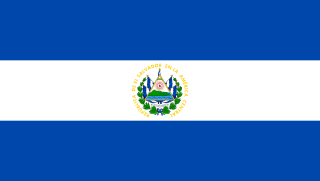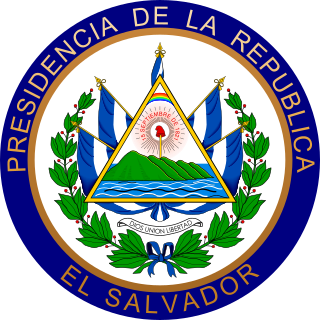| |||||
| Decades: | |||||
|---|---|---|---|---|---|
| See also: | |||||
The following lists events that happened in 1928 in El Salvador .
| |||||
| Decades: | |||||
|---|---|---|---|---|---|
| See also: | |||||
The following lists events that happened in 1928 in El Salvador .

El Salvador, officially the Republic of El Salvador, is a country in Central America. It is bordered on the northeast by Honduras, on the northwest by Guatemala, and on the south by the Pacific Ocean. El Salvador's capital and largest city is San Salvador. The country's population in 2023 was estimated to be 6.5 million.

Politics of El Salvador takes place in a framework of a presidential representative democratic republic, whereby the President of El Salvador is both head of state and head of government, and of an executive power is exercised by the government. Legislative power is vested in both the government and the Legislative Assembly. The Judiciary is independent of the executive and the legislature. The Economist Intelligence Unit rated El Salvador a "hybrid regime" in 2022.

The history of El Salvador begins with several Mesoamerican nations, especially the Cuzcatlecs, as well as the Lenca and Maya. In the early 16th century, the Spanish Empire conquered the territory, incorporating it into the Viceroyalty of New Spain ruled from Mexico City. In 1821, El Salvador achieved independence from Spain as part of the First Mexican Empire, only to further secede as part of the Federal Republic of Central America two years later. Upon the republic's isolation in 1841, El Salvador became sovereign until forming a short-lived union with Honduras and Nicaragua called the Greater Republic of Central America, which lasted from 1895 to 1898.
The Football War, also known as the Hundred Hours' War or 100 Hour War, was a brief military conflict fought between El Salvador and Honduras in 1969. Existing tensions between the two countries coincided with rioting during a 1970 FIFA World Cup qualifier. The war began on 14 July 1969 when the Salvadoran military launched an attack against Honduras. The Organization of American States (OAS) negotiated a cease-fire on the night of 18 July, which took full effect on 20 July. Salvadoran troops were withdrawn in early August.

San Salvador is the capital and the largest city of El Salvador and its eponymous department. It is the country's political, cultural, educational and financial center. The Metropolitan Area of San Salvador, which comprises the capital itself and 13 of its municipalities, has a population of 2,404,097. The urban area of San Salvador has a population of 1,600,000 inhabitants.

The Farabundo Martí National Liberation Front is a left-wing political party in El Salvador.

The president of El Salvador, officially titled President of the Republic of El Salvador, is the head of state and head of government of El Salvador. He is also, by constitutional law, the commander-in-chief of the Armed Forces of El Salvador. The office was created in the Constitution of 1841. From 1821 until 1841, the head of state of El Salvador was styled simply as Head of State.

The Nationalist Republican Alliance is a conservative, right-wing political party of El Salvador. It was founded on 30 September 1981 by retired Salvadoran Army Major Roberto D'Aubuisson. It defines itself as a political institution constituted to defend the democratic, republican, and representative system of government, the social market economy system and nationalism.

The Legislative Assembly is the legislative branch of the government of El Salvador.

The Salvadoran Civil War was a twelve-year period of civil war in El Salvador that was fought between the government of El Salvador and the Farabundo Martí National Liberation Front (FMLN), a coalition or "umbrella organization" of left-wing groups backed by the Cuban regime of Fidel Castro as well as the Soviet Union. A coup on 15 October 1979 followed by government killings of anti-coup protesters is widely seen as the start of civil war. The war did not formally end until 16 January 1992 with the signing of the Chapultepec Peace Accords in Mexico City.
Jews have been present in El Salvador since the early 19th century, starting with Sephardic Jews and continuing with the arrival of refugees from Europe during World War II. El Salvador has the second largest community in Central America, the majority established in San Salvador, which is the second city with the most Jews in Central America, behind Panama City.

Carlos Mauricio Funes Cartagena is a Salvadoran politician and former journalist who served as President of El Salvador from 2009 to 2014. Funes won the 2009 presidential election as the candidate of the left-wing Farabundo Martí National Liberation Front (FMLN) party and took office on 1 June 2009.

The Salvadoran military dictatorship was the period of time in Salvadoran history where the Salvadoran Armed Forces governed the country for almost 48 years from 2 December 1931 until 15 October 1979. The authoritarian military dictatorship limited political rights throughout the country and maintained its governance through rigged and fixed elections.

The vice president of El Salvador is a political position in El Salvador which is elected concurrently with the position of President of El Salvador.

El Salvador–Mexico relations are the diplomatic relations between El Salvador and Mexico. Both nations are members of the Association of Caribbean States, Community of Latin American and Caribbean States, Organization of American States, Organization of Ibero-American States and the United Nations.

Nayib Armando Bukele Ortez is a Salvadoran politician and businessman who is the 43rd president of El Salvador, serving since 1 June 2019. He is the first president since José Napoleón Duarte (1984–1989) not to have been elected as the candidate of one of the country's two major political parties: the left-wing Farabundo Martí National Liberation Front (FMLN) and the right-wing Nationalist Republican Alliance (ARENA).

The National Party of the Fatherland, usually translated as the National Pro Patria Party or simply the Pro Patria Party, was a far-right political party which was the sole-legal political party in El Salvador from its establishment in 1933 until its dissolution in 1945. The party was founded by President General Maximiliano Hernández Martínez to support his government.

El Salvador–Palestine relations refers to the diplomatic relations between the Republic of El Salvador and the State of Palestine. Both nations enjoy friendly relations, the importance of which centers on the history of Palestinian migration to El Salvador. There is a community of approximately 60,000–100,000 people of Palestinian origin in El Salvador.

The COVID-19 pandemic in El Salvador was a part of the worldwide pandemic of coronavirus disease 2019 caused by severe acute respiratory syndrome coronavirus 2. The virus was confirmed to have reached El Salvador on 18 March 2020. As of 19 September 2021, El Salvador reported 102,024 cases, 3,114 deaths, and 84,981 recoveries. As of that date El Salvador had arrested a total of 2,424 people for violating quarantine orders, and 1,268,090 people had been tested for the virus. On 31 March 2020, the first COVID-19 death in El Salvador was confirmed.

The Hospital El Salvador is a major hospital in San Salvador, El Salvador, and is planned to be the largest hospital in Latin America. The first phase was constructed between March and June 2020 as a conversion of the International Fair and Convention Center and forms part of El Salvador's response to the COVID-19 pandemic, exclusively receiving COVID-19 patients. Originally intended to be temporary, it was announced in June 2020 that the hospital conversion would be made permanent. In its first phase, the hospital has 400 available beds, a number which was expected to increase to 2,000 total beds upon completion of phase 3 of construction. However, phase 3 was not opened as a hospital and instead served as a vaccination facility.